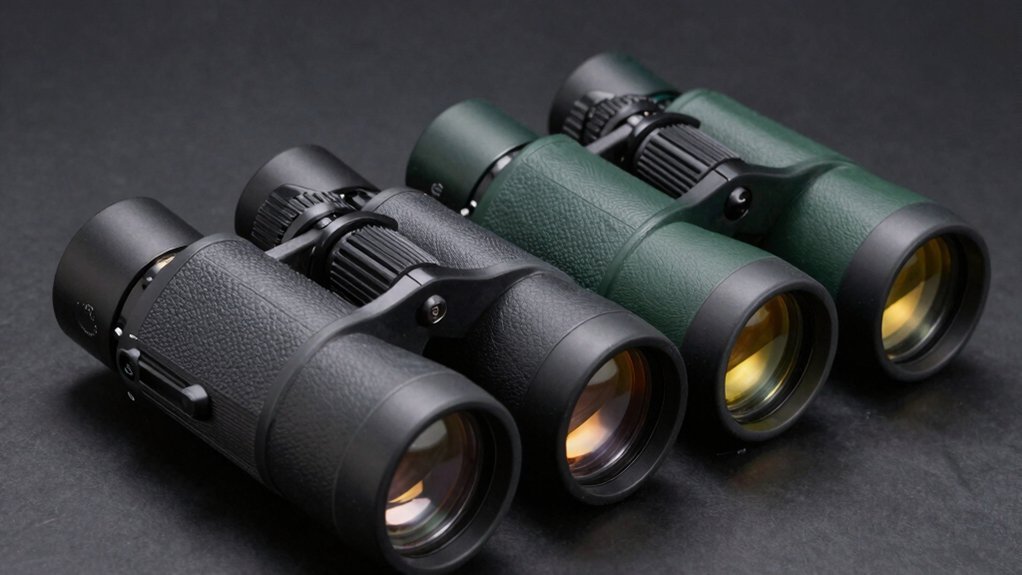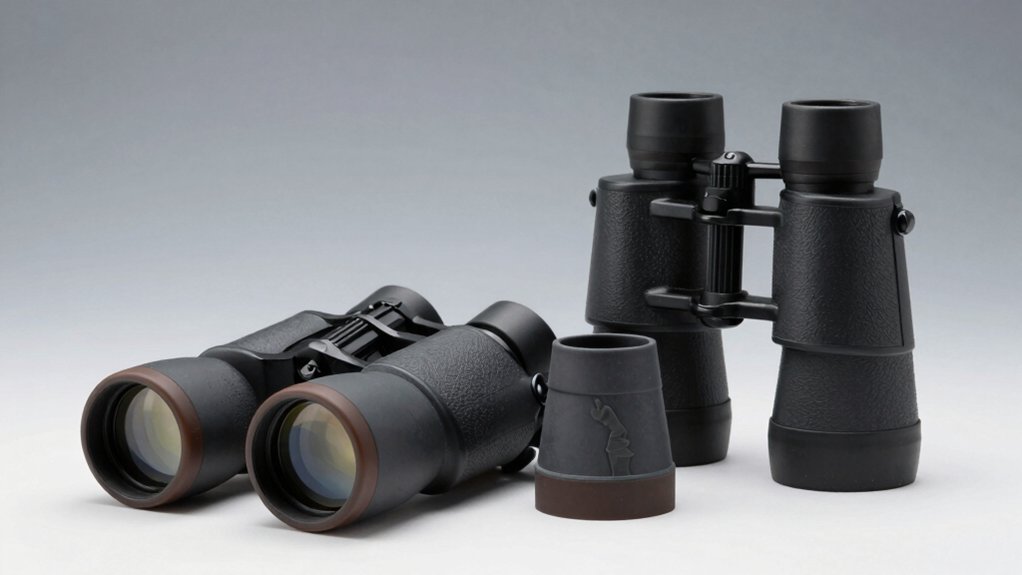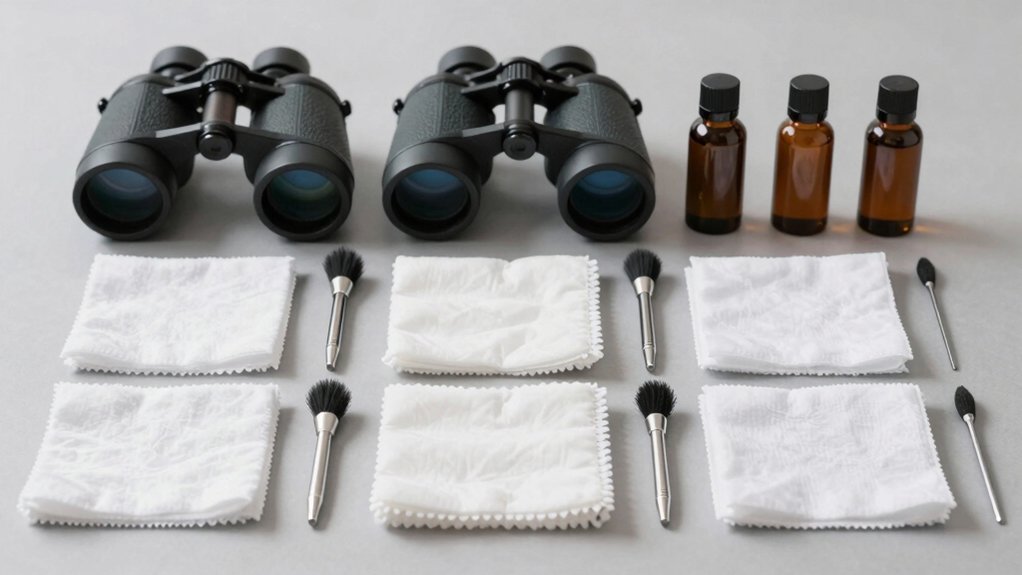You'll find that astronomy board games have evolved far beyond simple trivia cards and dice rolls. The 2025 lineup combines cutting-edge educational insights with genuinely entertaining gameplay mechanics. Whether you're a parent seeking STEM activities or an educator looking to spark curiosity about space, these seven carefully selected games offer the perfect balance of fun and learning. Let's explore how each one can transform your next family game night into an cosmic adventure.
SimplyFun Planet Voyagers Astronomy Game (Ages 8 & Up)
If you're looking to combine space exploration with educational fun for elementary and middle school students, SimplyFun Planet Voyagers delivers an engaging astronomy experience. This 2-5 player game challenges kids to race their rockets to Neptune while gathering research points through planetary discoveries.
You'll find alignment with STEM standards as players develop critical thinking skills and space science knowledge. The game's high-quality components include durable cards, an educational poster, and clear instructions. Whether you're homeschooling or hosting family game night, the strategic gameplay keeps children aged 8 and up engaged while they learn about our solar system's wonders.
Best For: Families and educators seeking an educational board game that teaches astronomy and space science concepts to children ages 8-15 while maintaining an engaging, competitive gameplay experience.
Pros:
- Combines educational value with entertaining gameplay mechanics through space exploration and point collection
- Aligns with STEM curriculum standards and develops multiple skills including critical thinking and strategic planning
- High-quality, durable components including educational poster and clear instructions make it suitable for repeated use
Cons:
- Limited to 2-5 players, which may not accommodate larger groups or classrooms
- Younger players (under 8) may need significant assistance to understand gameplay mechanics
- Some educational content may be too basic for older players or space enthusiasts who already know planetary facts
Trekking Through History Family Board Game by Underdog Games
While this game's title includes "Trekking Through History," it appears to be incorrectly categorized under "Astronomy Board Games" as it focuses on historical events rather than astronomical content.
You'll journey through 108 historic events using oversized cards featuring original artwork and fascinating stories. The game doesn't require prior history knowledge, making it perfect for players aged 10 and up. With its Time-Warp mini expansion, you'll gain strategic depth through time-bending powers.
The game's high production quality includes a neoprene mat and functional insert. You'll appreciate the educational snippets on card backs while enjoying 45-60 minutes of gameplay with 2-4 players.
Best For: Families and history enthusiasts seeking an engaging, educational board game that combines strategic gameplay with historical storytelling for ages 10 and up.
Pros:
- High-quality components including oversized cards, neoprene mat, and functional storage insert
- Educational value with historical facts on card backs without requiring prior knowledge
- Accessible gameplay mechanics that appeal to both casual and experienced gamers
Cons:
- Limited to 2-4 players, which may not accommodate larger groups
- 45-60 minute playtime might be too long for some younger players
- Incorrectly categorized as an astronomy game, which could mislead potential buyers
Space Flash Cards – STEM Learning Resource (75 Cards)
Space enthusiasts seeking a convenient way to master astronomical concepts will find these 75 STEM flash cards an invaluable learning resource. Made by Briston, a Michigan-based family company, these durable cards feature vivid astronomical images with five detailed facts on each reverse side.
You'll appreciate the sturdy 300gsm cardstock construction with glossy lamination that resists water and scratches. At 3.55 x 2.05 inches, they're perfectly portable. While designed for ages 15+, younger space fans can enjoy them with parental guidance. With a 4.5/5 star rating, users praise their clarity and educational value. They're ideal for homeschooling, family activities, and sparking deeper conversations about our universe.
Best For: Space enthusiasts, science students (ages 15+), and homeschooling families looking for a portable, durable educational resource to learn about astronomy and the universe.
Pros:
- High-quality construction with water-resistant 300gsm cardstock and glossy lamination
- Comprehensive educational content with five detailed facts per card and vivid astronomical images
- Aligns well with science curriculum and received positive user feedback (4.5/5 stars)
Cons:
- Limited coverage of astronomical objects compared to what some users desire
- Card size (3.55 x 2.05 inches) may be too small for some users' preferences
- May be too advanced for younger children without parental guidance
Astronauts Space Exploration Game & Educational Astronomy Gift
This thrilling card game challenges 2-5 players to explore the solar system while dodging cosmic hazards like black holes and asteroids. You'll race through planets and moons, using boosters and hyperspace to slingshot between destinations before safely returning to Earth.
The game includes 56 cards featuring planets, moons, and special moves, making it ideal for ages 9 and up. You'll learn fascinating astronomical facts while competing for points – the further you explore, the more points you'll earn, but getting back becomes trickier. With a 4.4-star rating from 502 reviews, it's compact, educational, and offers varying difficulty levels to keep you engaged.
Best For: Space enthusiasts and families with children ages 9+ who want to combine entertainment with astronomy education in a competitive card game format.
Pros:
- Educational gameplay that teaches real astronomical facts about planets, moons, and space phenomena
- Multiple difficulty levels accommodate different age groups and skill levels
- Compact design with 56 cards makes it portable and easy to store
Cons:
- Some players find the initial rules confusing and difficult to learn
- Limited to 2-5 players, which may not work for larger groups
- Game dynamics can change rapidly, which might frustrate strategic players
Buffalo Games Starry Night Sky Board Game
Board game enthusiasts seeking an astronomical adventure will find Buffalo Games' Starry Night Sky the perfect blend of strategy and stargazing. This track-oriented game lets you explore the cosmos while competing to map constellations across a beautifully illustrated night sky board.
Designer Emma Larkins has created an accessible yet challenging experience that'll remind you of Ticket to Ride but with unique astronomical twists. You'll navigate telescopes, uncover hidden star patterns, and outmaneuver opponents in this 2-4 player competition. With durable components and stunning artwork depicting galaxies and star clusters, you're not just playing – you're learning about real astronomy while having fun.
Best For: Families and game enthusiasts ages 10+ who enjoy strategic board games and have an interest in astronomy or space exploration.
Pros:
- Beautiful artwork and high-quality components featuring detailed astronomical illustrations
- Educational value that teaches real constellation mapping and astronomical concepts
- Combines accessible rules with strategic depth, making it enjoyable for both casual and serious gamers
Cons:
- Limited to 2-4 players, which may not accommodate larger groups
- Price point may be higher compared to similar strategy board games
- Learning curve might be steep for younger players or those unfamiliar with strategy games
SimplyFun Planet Voyagers Astronomy Game for Children
SimplyFun Planet Voyagers offers children aged 8 and up an engaging way to explore the solar system while developing critical thinking skills.
In this race to Neptune, you'll advance your rocket pawn, deploy research probes, and compete to identify planetary facts. The game supports 2-5 players and aligns with Math and STEM standards, making it perfect for both family game nights and homeschooling.
You'll find high-quality components, including durable cards, an eye-catching poster, and a detailed instruction booklet. Whether you're racing to be the first to reach Neptune or aiming to collect 12 points through strategic gameplay, you'll discover that learning about space has never been more entertaining.
Best For: Families and educators seeking an educational board game that makes learning about astronomy fun and engaging for children ages 8 and up.
Pros:
- Combines entertainment with educational value by teaching astronomy concepts and facts while maintaining engaging gameplay
- Versatile player count (2-5 players) makes it suitable for both small and larger groups
- High-quality, durable components including an educational poster and detailed instruction booklet
Cons:
- Younger children under 8 may need significant assistance to play effectively
- Limited to solar system content, which may not interest children who prefer other science topics
- Competitive aspects like taking research points from other players might create conflict among sensitive players
Renegade Games The Search for Planet X Board Game
Space enthusiasts and logic puzzle fans will find their perfect match in The Search for Planet X, an innovative deduction game that transforms players into astronomers hunting for a mysterious celestial body.
You'll use a companion app to scan sectors, attend conferences, and mark your deductions while searching for Planet X. The game's randomized setup guarantees every session offers a unique challenge, whether you're playing solo or with up to four players.
While there's a learning curve, the game's varying difficulty levels and robust replayability make it worthwhile. You'll appreciate the high-quality components and seamless tech integration as you apply scientific reasoning to unravel the cosmic mystery.
Best For: Space enthusiasts, logic puzzle lovers, and board game groups who enjoy challenging deduction games with a scientific theme and don't mind using a companion app.
Pros:
- Innovative gameplay mechanics that combine traditional board game elements with a helpful digital companion app
- High replayability through randomized setups and multiple difficulty levels
- Excellent solo play option while still maintaining engaging multiplayer experiences
Cons:
- Initial learning curve might be steep for some players
- Dependency on companion app raises concerns about long-term playability
- 60-75 minute playtime might be too long for casual gaming sessions
Factors to Consider When Choosing Astronomy Learning Board Games
When selecting an astronomy board game for educational purposes, you'll want to match the difficulty level to the players' ages while ensuring the scientific content is accurate and engaging. You should consider both the minimum and maximum number of players supported, as well as how much time you can commit to completing a game session. It's also important to check the durability of components like cards, boards, and pieces, especially if younger astronomers will be handling them.
Age-Appropriate Difficulty Level
Choosing an age-appropriate astronomy board game stands as one of the most essential factors in guaranteeing an engaging learning experience. You'll want to match the game's complexity with your child's cognitive abilities and astronomical knowledge.
For children aged 8 and up, look for games that blend basic astronomy concepts with straightforward mechanics. These games work particularly well for elementary school students, helping them develop critical thinking while learning about space. If you're shopping for older players (10+), you can opt for games with more sophisticated gameplay and in-depth astronomical themes.
Remember to check the learning curve before purchasing. While some games require advanced reasoning skills, others offer simpler card mechanics that won't overwhelm younger players. This guarantees everyone can participate and learn effectively.
Educational Content Quality
High-quality educational content serves as the cornerstone of effective astronomy board games. When evaluating these games, you'll want to verify they align with STEM core standards and effectively teach both earth and space science concepts.
Look for games that incorporate accurate planetary facts and celestial information through engaging mechanics like illustrated cards and well-designed boards. The best educational games don't just present facts—they challenge players to think critically and solve problems while learning. You'll find the most effective games feature multi-level learning approaches, making them suitable for both novice astronomers and more advanced space enthusiasts.
Choose games that blend educational value with entertainment through compelling narratives and interesting facts. This combination helps make complex astronomical concepts more digestible and memorable while maintaining player engagement.
Number of Players
Beyond educational content, the number of players a game accommodates can make or break your astronomy learning experience. When selecting an astronomy board game, you'll want to carefully consider your typical group size and playing environment.
Games supporting 4-5 players are excellent choices for family gatherings or classroom settings, as they foster greater social interaction and create engaging competitive dynamics. However, if you're planning to use the game primarily for one-on-one teaching or small group instruction, opt for games designed for 2-4 players, which often provide faster turns and more focused learning opportunities.
Look for astronomy games that offer flexible player counts, allowing you to adapt to different situations. Some games even scale their complexity based on player numbers, ensuring a favorable experience regardless of group size.
Playing Time Requirements
When selecting an astronomy board game, you'll need to match the playing time with your intended learning environment and audience. Most astronomy games run between 30 to 75 minutes, but choose wisely based on your players' engagement levels.
If you're playing with younger students or beginners, opt for games that take 30-45 minutes to complete. These shorter sessions help maintain focus and enthusiasm throughout the learning experience. For more advanced players who enjoy strategic thinking, you'll want to take into account games that last 60-75 minutes, giving them ample time to develop their tactics.
Remember that player count affects game duration. More participants typically mean longer playing times due to additional turns and interactions. Reflect on your schedule and players' availability when planning your astronomy gaming sessions.
Physical Component Durability
The durability of astronomy board game components plays an essential role in their educational value and long-term investment potential. You'll want to focus on games that feature high-quality materials, including thick cardstock and sturdy plastics that can withstand frequent handling during learning sessions.
Look for water and scratch-resistant components, particularly for cards and game boards that'll see regular use. When evaluating options, pay attention to user reviews that specifically mention durability and component quality. If you're considering portable games, don't compromise on material quality for the sake of compactness. The best astronomy board games maintain a balance between durability and functionality, ensuring that tokens, boards, and other pieces can endure repeated play without losing their integrity or educational effectiveness.
Learning Curve Complexity
Understanding an astronomy board game's learning curve presents a crucial factor in selecting the right educational experience for your needs. You'll find that games designed for younger players typically offer simpler mechanics and quicker gameplay, making them easier to grasp from the start.
If you're new to astronomy board games, look for titles with tutorial modes or companion apps that'll guide you through the basics. These features can considerably reduce the initial learning barrier. While games targeting older players often include more complex strategies and deductive reasoning, they'll reward your dedication with deeper engagement.
Consider your astronomy knowledge level and preferred gameplay duration when choosing. If you're already familiar with astronomical concepts, you'll likely adapt faster to complex game mechanics than someone starting from scratch.
STEM Curriculum Alignment
Selecting astronomy board games that align with STEM curriculum standards can maximize their educational value in both classroom and home settings. When choosing these games, you'll want to look for ones that integrate core math concepts and scientific reasoning with space exploration themes.
The best astronomy games support grade-appropriate learning objectives while making complex concepts accessible through hands-on gameplay. You'll find that games incorporating fact cards and interactive elements help strengthen reading comprehension and critical thinking skills. They should also encourage collaborative problem-solving, which is essential for STEM education.
Check if the game's content matches your specific educational goals. Many titles feature earth and space science components that complement existing curricula, making them valuable tools for reinforcing classroom lessons or enriching homeschool activities.
Frequently Asked Questions
Can Astronomy Board Games Be Played Outside Under Real Stars?
You can play astronomy board games outside under the stars, but you'll need proper lighting to see game pieces. Consider using red lights to preserve your night vision while enjoying both gameplay and stargazing.
Do Any Astronomy Board Games Require Internet Connectivity or Digital Components?
You'll find most astronomy board games are fully analog and don't need internet. However, some modern versions include optional companion apps or QR codes that enhance gameplay with digital star maps and quizzes.
Are These Games Suitable for Colorblind Players?
You'll find most astronomy board games use multiple accessibility features beyond color alone, including symbols, patterns, and textures. If you're colorblind, look for games that specifically mention colorblind-friendly design elements.
How Long Does It Take to Learn Most Astronomy Board Games?
You'll typically learn most astronomy board games within 15-30 minutes. They're designed to be accessible, though some complex ones might take an hour to fully grasp all strategies and mechanics.
Can Astronomy Board Games Be Played Competitively in School Tournaments?
Yes, you'll find many schools host astronomy board game tournaments. They're great for competitive STEM learning and team building. You can even organize inter-school competitions to make science education more engaging and fun.
In Summary
You'll discover that astronomy board games offer a perfect blend of entertainment and education for space enthusiasts of all ages. Whether you're exploring distant planets, solving cosmic mysteries, or learning constellation patterns, these games make complex concepts accessible and enjoyable. Choose the game that matches your interests and skill level, and you'll soon be starting on exciting astronomical adventures right from your table.





Leave a Reply